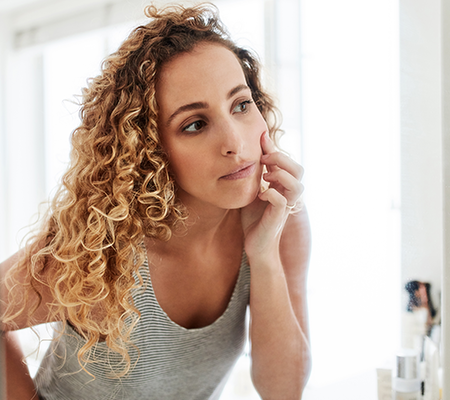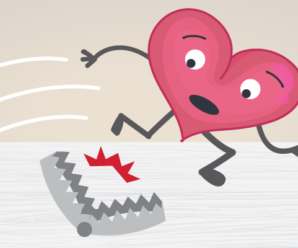
When a pesky zit or breakout occurs, it can be very tempting to try to get rid of them yourself by popping the pimples. While this may feel good in the moment, you are putting your skin at risk of scarring, infection or further inflammation. Before you make the decision whether or not to attack your acne on your own, consider these four things.
Acne causes and myths
“Acne is a multi-factorial disease that is not caused by just one thing,” said Dr. Maggie Moses, a dermatologist from Marshfield Clinic Health System. “The highest density for acne is in the oiliest places and where hair grows.” The bacteria that clogs your pores and causes acne is not an infection. Rather, it causes inflammation of the pores. Additionally, hormones can play a role. Hormones can cause an influx of oil production during puberty and is the cause of acne flaring during menstrual cycles for women throughout their lives.
Another cause of acne can be repeated friction. This occurs more often these days in what Dr. Moses called “maskne.” The friction of face masks against the chin and cheeks can cause pimples to pop up. Friction acne can also be seen along the hairline in people who wear helmets or hats frequently. If you are experiencing lots of acne caused by wearing a mask, change your mask out frequently and do not wear it more often than you have to.
Many myths abound about what else causes acne. Food choice is often cited as a culprit for zits, but there is not a lot of data that food leads to acne. Dr. Moses explained that low-fat dairy products and foods with high sugar contents can sometimes cause mild breakouts. However, they are not the sole cause of pimples. Additionally, acne is often blamed on higher stress levels. However, stress is not considered a key factor in acne production.
Is pimple-popping really that bad?
The short answer, yes. Popping pimples increases inflammation in an already inflamed area of your skin. When you pop your pimples, you can leave behind dark spots, risk scarring your skin, and even break open your skin and cause scabs. And the most frustrating part of all of this, you actually cause your pimples to last a lot longer than if you would have just left them alone.
However, popping pimples is not the end of the world. “Have I popped a pimple?” said Dr. Moses. “Yes. It is not recommended to do routinely, but in reality, most people pop their pimples.”
Watch this video for more on popping pimples.
Popping pimples safely
Generally speaking, acne will go away on its own if left alone. However, we are all likely to pop our pimples at some point. So if you do, follow these steps to keep from damaging your skin.
Only pop pimples that are whiteheads or blackheads, have no surrounding redness and look like they are just about to burst through the skin. It should not be sore or painful to the touch; if it is, do not pop it, as you are more likely to damage your skin or cause a sore.
Wash your hands and apply very gentle pressure on either side of the pimple. If it does not pop right away, do not continue to try, as it is not ready to be popped. Alternatively, you can purchase a blackhead remover, also known as a “comedone extractor.” This is a metal instrument with a loop on the end that you can use to safely remove pimples.
Other options for removing acne
Instead of popping your pimples, there are non-damaging ways to remove acne quickly. Hydrocolloid patches, which can be purchased over-the-counter, can draw out a whitehead and extract the contents without causing inflammation or scarring. Additionally, over the counter benzoyl peroxide can target inflammation and bacteria and dry up a pimple quickly. Dr. Moses warned that pregnant women should see a doctor before choosing any of these options, as certain medications may not be safe during pregnancy.
If you are struggling with acne, consider seeing a dermatologist to help you determine a solution. “We want to see everyone,” said Dr. Moses. “We can help with mild acne, hormonal acne, severe scarring and providing safe acne treatments for all.”
For pimple concerns, talk to a Marshfield Children’s provider.
Schedule appointment Message your provider
Related Shine365 articles
Depression: Different signs in teens, adults






Leave a Reply